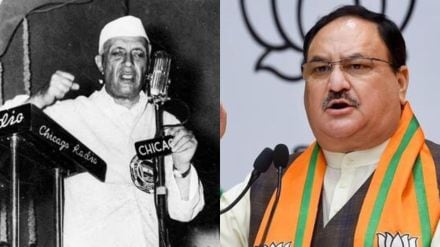Union Health Minister and BJP national president JP Nadda on Monday blamed the country’s first prime minister, Pandit Jawaharlal Nehru for the “blunder” of the Indus Waters Treaty (IWT). Nadda said the treaty was a result of Nehru’s “personal ambitions”that “permanently compromised India’s water security and national interest”. In a long post on social media platform X, he shared how the treaty was finalised, despite opposition from within Nehru’s party.
He said it was a “Himalayan blunder”, that “PM Modi corrected” by putting the Indus Water Treaty in abeyance.
“The Indus Water Treaty, 1960, was one of the biggest blunders of former PM Jawaharlal Nehru that kept national interest at the altar of personal ambitions. The nation must know that when former Pandit Nehru signed the Indus Waters Treaty with Pakistan, he unilaterally handed over 80 per cent of Indus basin waters to Pakistan, leaving India with just 20 per cent of the share,” Nadda said.
“It was a decision that permanently compromised India’s water security and national interest. The most appalling aspect was that he did it without consulting the Indian Parliament. The treaty was signed in September 1960. However, it was placed before Parliament only two months later, in November, and that too, for a token discussion of mere 2 hours!” he added.
A ‘monumental blunder’: Nadda
Nadda called the treaty a “monumental burden”, adding that the MPs of Jawaharlal Nehru’s own party “opposed it”. Nadda claimed that Nehru yielded far too much, and received “nothing in return”.
“Congress’s Asoka Mehta slammed the treaty and called it akin to a ‘second partition’ for the country. His words expressed the grief and shock felt not only within his own party but also across the opposition and the nation on Nehru’s complete surrender,” he added.
The BJP president further said that Congress’s AC Guha criticised paying Rs 83 crore in sterling to Pakistan when India faced a foreign exchange crisis. “He cited it as “the height of folly.” Guha warned that the way Parliament has been bypassed, “this may be the attitude of a totalitarian government”. He also questioned as to “why should India make all the sacrifices to placate Pakistan when Pakistan is not in a mood to be on friendly terms with India,”” Nadda said.
Nadda recalls how Vajpayee challenged Nehru
The Union Health Minister recalled that at the time when the treaty was under discussion, “a young MP, Atal Bihari Vajpayee, tore into Nehru’s Indus Water Treaty“.
“He warned that the Prime Minister’s argument, that succumbing to Pakistan’s unreasonable demands would establish friendship and goodwill, was flawed. True friendship, he argued, cannot be built on injustice. If opposing Pakistan’s unfair demands led to strained relations, then so be it! Such was the clarity with which Atal ji placed India’s national interest above everything else,” the BJP National President said.
The BJP leader said that when Nehru rose to speak, his arguments were not only unconvincing but far removed from the national sentiment. Despite his party colleagues’ strong opposition, Nehru defended the Indus Water Treaty as beneficial for India, Nadda said.
“If that was not enough, he belittled the nation’s anguish by asking, “Partition of what? A pailful of water?”” Nadda stressed, adding that Nehru even admitted to taking the decisions without bothering about Parliamentary approval in matters of international treaties.
“To add insult to injury, he derided the opinions of fellow parliamentarians who spoke for the national interest as being too “narrow,”” he said.
Nadda’s ‘Himalayan blunder’ remark
Nadda said that Nehru was a PM “who disregarded Parliament, gambled away India’s lifelines, and tied India’s hands for generations.”
“Even today, India would have continued to pay the price for one man’s misplaced idealism, if not for Prime Minister Modi’s bold leadership and his commitment to ‘Nation First’,” he said.
Pahalgam attack and India’s decision on IWT
India put the Indus Waters Treaty in abeyance in April this year, after terrorists killed 26 tourists in the Baisaran meadow of Pahalgam, Jammu and Kashmir. India took multiple decisions to teach Pakistan a lesson, and cancelled all visa and other diplomatic services.
Pakistan threatened India of nuclear war on multiple occasions if the treaty was put on hold. However, India rejected all warnings and said that “blood and water cannot flow at the same time”. The Indus waters are very crucial for Pakistan as it gets 80% from the tributaries, critical for its lifeline.
